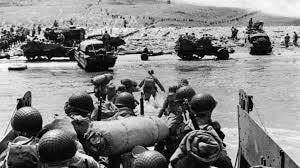A Day Unlike Any Other
A Lesson in Leadership and Responsibility from Ike
“A day unlike any other.”
- Andy Rooney (see video here)
A Day Unlike Any Other
This past week the world remembered the 80th anniversary of the June 6, 1944 invasion of Normandy. There were many moving tributes and remembrances. Some memorials included survivors of this history-changing day. These veterans are all at or near 100 years old, and they carry with them memories of “a day unlike any other.”
Philosopher George Santayana reminded us, “Those who don’t remember the lessons of the past are condemned to repeat them.” History is filled with lessons of how to - and not to - lead. The following is an excerpt from Chasing Influence about a little-known example of leadership that comes from Dwight D. Eisenhower’s command of the D-Day invasion of France, “Operation Overlord.”
In the weeks leading up to June 6, 1944 Eisenhower worked 20-hour days. In the little time he had for rest, he didn’t sleep well. While fueled by cup after cup of coffee and up to four packs of unfiltered cigarettes each day, Ike planned the largest military invasion the world had ever seen, a coordinated attack involving nearly 200,000 men. The fate of World War II hung in the balance.
As Eisenhower planned the operation he carefully gave credit to others in the event of success while preparing to bear responsibility if the assault ended in defeat. The night before the invasion he sat down and penned a message to the troops to be broadcast over the radio the following morning after what he hoped would be a successful attack. The statement ended with “We accept nothing less than full victory!” Under Ike’s leadership and with incredible bravery, the Allied troops, despite being under heavy fire and suffering terrible casualties, won the day and turned the tide of World War II.
What most people do not know is that Ike also wrote a second message that night, one he never delivered and was subsequently filed away. Known as the “In Case of Failure” letter, the message contained only four short sentences:
“Our landings in the Cherbourg-Havre area have failed to gain a satisfactory foothold and I have withdrawn the troops. My decision to attack at this time and place was based upon the best information available. The troops, the air and the Navy did all that Bravery and devotion to duty could do. If any blame or fault attaches to the attempt it is mine alone.”
This short note is a remarkable glimpse into Eisenhower’s character and the importance of accountability. Had the invasion failed, Eisenhower was prepared to accept total responsibility and blame. Good leaders are quick to not only accept responsibility and give credit to others, but when something goes wrong, these leaders look in a mirror and take responsibility. As leaders, no matter what happens within our groups, either good or bad, choose to accept responsibility. Ike was ready to do this on “a day unlike any other.” Let’s practice this habit on our ordinary days!
“If any blame or fault attaches to the attempt, it is mine alone.”
— General Dwight Eisenhower
Connecting this quote to the story. Eisenhower showed the world how true leaders take full responsibility for their decisions and actions, especially in the face of failure.
This week’s Chasing Influence tip: Plan and prepare, but be ready to adapt quickly to unforeseen challenges!
If you enjoyed this story, a series of three Chasing Influence workbooks is available. Stories are accompanied by discussion questions and answers. Each workbook contains 33 lessons to use with any team.
Updates on Chasing Influence
Chasing Influence: Transformational Coaching to Build Champions for Life is available in Kindle, softcover, hardcover, and audiobook editions.
For additional resources, links to podcast appearances, and other Chasing Influence news, click here.
©Troy Urdahl, 2024


